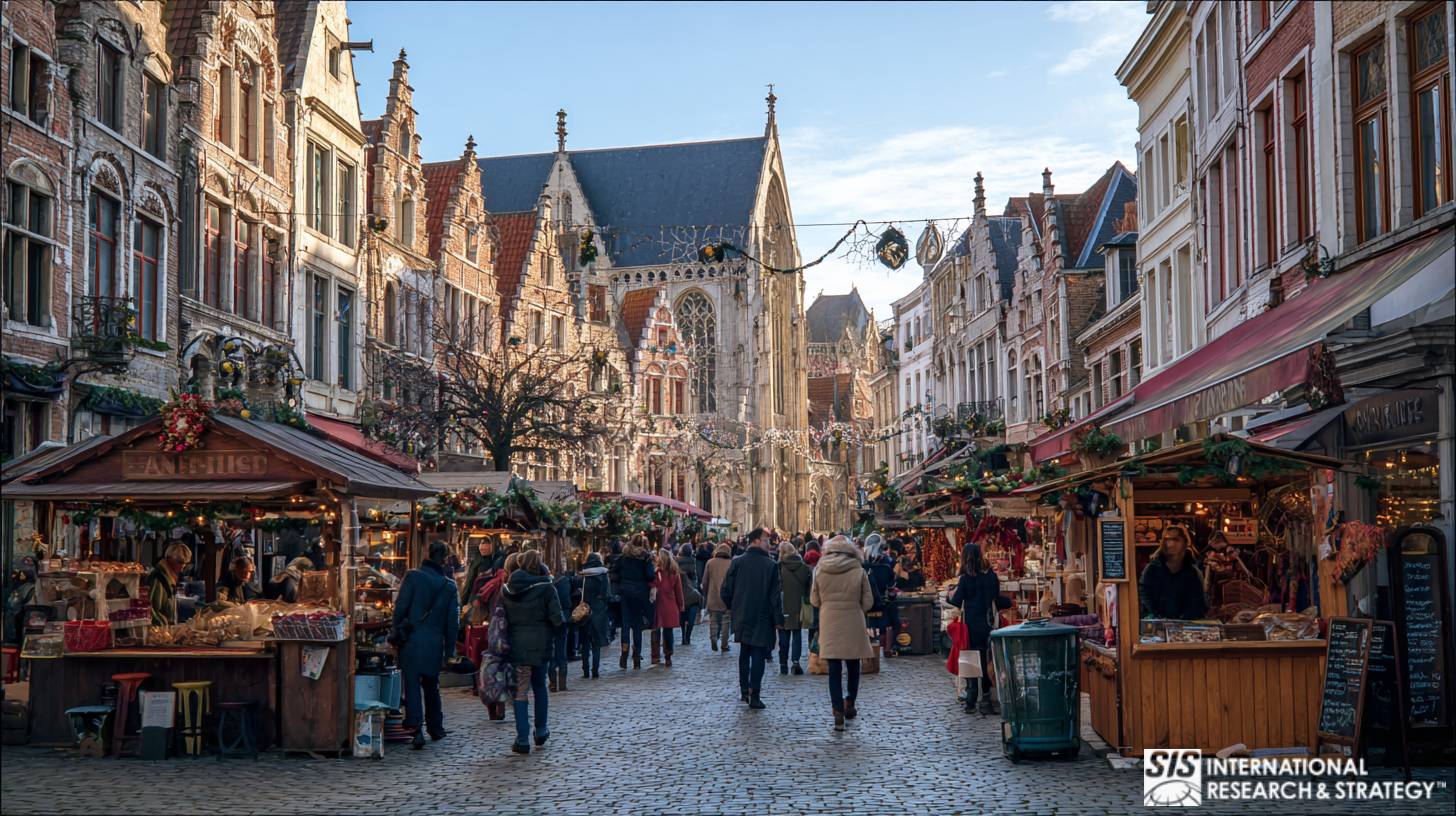Etude de marché en Belgique

La Belgique possède une économie moderne, bénéficiant de sa situation géographique centrale.
Le français, le néerlandais et l'allemand sont les trois langues officielles du Royaume de Belgique. En outre, plusieurs dialectes non officiels et langues minoritaires sont parlés.
Have you ever wondered what makes a market truly unique? What if I told you that market research in Belgium offers insights that go far beyond traditional economic analysis? Our team at SIS International has spent years unraveling the economic complexities of this remarkable country.
Economic Complexity in a Strategic Hub
What makes Belgium truly remarkable is its ability to serve as a microcosm of European economic trends while maintaining a distinct national identity. Our 40 years of global experience have taught us that the most valuable insights often emerge from markets that require deeper, more nuanced investigation.
We’ve supported everything from specialized European enterprises to global corporations in understanding the nuanced Belgian market. Our research methodologies blend quantitative data analysis with qualitative cultural insights, ensuring that our clients understand not just the numbers, but the strategic context behind those figures.
Secteurs économiques clés

The economic composition of Belgium is surprisingly robust and diverse. Our specialists have identified several critical sectors that make market research in Belgium particularly compelling:
- Chemical and Pharmaceutical Industries: This sector is a global powerhouse. Our research shows a sophisticated ecosystem of research, development, and manufacturing that attracts international investments. Companies like UCB and Janssen Pharmaceutica have positioned Belgium as a critical global player in life sciences.
- Technologie et innovation: Belgium has developed a cutting-edge technology ecosystem. We’ve uncovered a network of innovation hubs, particularly in cities like Brussels, Antwerp, and Ghent, that are driving advances in artificial intelligence, biotechnology, and digital technologies.
- Logistique et transport: Leveraging its strategic geographical position, Belgium has created a world-class logistics infrastructure. Our market research in Belgium has tracked how the country has transformed its central European location into a competitive advantage, with the port of Antwerp being one of the largest and most sophisticated in the world.
Principaux partenaires commerciaux
Les pays de l'Union européenne, principalement les Pays-Bas, l'Allemagne, la Grande-Bretagne et la France, représentent les trois quarts des partenaires commerciaux de la Belgique. Les États-Unis sont également un partenaire commercial majeur. Les produits et marchandises en provenance des pays de l’UE entrent en Belgique sans aucun droit ni tarif.
La Belgique a une perspective unique sur les marchés internationaux et le commerce mondial, puisqu'elle abrite plus d'une centaine d'organisations mondiales et le centre des opérations de l'Union européenne et de l'Organisation du Traité de l'Atlantique Nord (OTAN). Chacune des trois régions belges a le pouvoir d'accorder des incitations financières et autres pour attirer des biens et services étrangers, en plus des accords commerciaux nationaux.
Économie stable
La Belgique a une économie ouverte, offrant un environnement stable pour les investissements étrangers directs. Il n'y a aucune discrimination entre les entreprises étrangères et locales ou entre les filiales et succursales. Les entités étrangères peuvent donc bénéficier de tous les privilèges conférés à leurs homologues nationales, et les responsabilités juridiques sont les mêmes. Il n'existe pratiquement aucune restriction de change sur le transfert de bénéfices ou de capitaux.
Les différences linguistiques, culturelles et économiques des trois régions belges ont un fort impact sur la manière dont les affaires sont menées. Avec une répartition des revenus relativement équilibrée et un revenu par habitant élevé, les Belges bénéficient d'un pouvoir d'achat largement réparti. La Belgique est souvent considérée comme une économie test, car avec sa diversité ethnique et linguistique, elle reflète le consommateur et l’économie européens en général : une mini-Europe dans laquelle il est plus facile d’accéder que la plupart des grands marchés de la région.
Opportunities and Challenges in Market Research in Belgium

Throughout my four decades leading SIS International, I’ve learned that true market intelligence isn’t about avoiding challenges—it’s about transforming them into strategic opportunities. Market research in Belgium presents a unique landscape that demands both analytical precision and creative thinking.
Opportunities: The Hidden Gems of Belgian Market Research
1. Diversification économique
When most researchers look at Belgium, they see a small European country. But our team sees a world of potential. Market research in Belgium reveals an economic ecosystem that is both resilient and innovative:
- Multilingual Advantage: Belgium’s linguistic diversity (Dutch, French, and German) creates unique market segmentation opportunities that are rarely found in other countries.
- Innovation Ecosystems: Brussels, Antwerp, and other major cities have developed robust innovation hubs that attract global technology and research investments.
- Strategic Positioning: As the headquarters of the European Union and NATO, Belgium offers unparalleled insights into European policy, economic trends, and international business dynamics.
2. Strategic Global Positioning
Belgium’s unique location offers remarkable advantages:
- Central hub in Western Europe
- Sophisticated international infrastructure
- Gateway to European and global markets
- Complex regulatory environment that demands deep market understanding
Challenges: The Complexity That Demands Expertise
1. Regional Economic Complexities
Étude de marché in Belgium isn’t straightforward. The challenges include:
- Distinct economic characteristics of Flanders, Wallonia, and Brussels
- Complex political and linguistic divisions
- Varied economic performance across regions
- Intricate regulatory landscapes
2. Obstacles à la collecte de données
Conducting comprehensive market research in Belgium comes with significant challenges:
- Multilingual data collection
- Regional statistical variations
- Complex business reporting structures
- Nuanced cultural communication barriers
3. Volatilité économique
The Belgian economy is sensitive to:
- European Union economic policies
- Global technological disruptions
- International trade fluctuations
- Rapid technological and innovation shifts
Avantage concurrentiel : la différence SIS International
Why do 70% of Fortune 500 companies trust us? Because we don’t just observe markets—we decode them. Our market research in Belgium goes beyond surface-level data, providing strategic narratives that transform challenges into competitive advantages.
We’ve supported clients ranging from specialized European enterprises to global corporations, helping them navigate the nuanced Belgian market with confidence and precision.
Notre emplacement à New York
11 E 22nd Street, étage 2, New York, NY 10010 Tél. : +1(212) 505-6805
À propos de SIS International
SIS International propose des recherches quantitatives, qualitatives et stratégiques. Nous fournissons des données, des outils, des stratégies, des rapports et des informations pour la prise de décision. Nous menons également des entretiens, des enquêtes, des groupes de discussion et d’autres méthodes et approches d’études de marché. Contactez nous pour votre prochain projet d'étude de marché.

